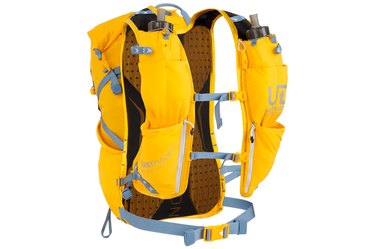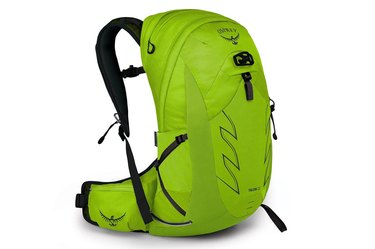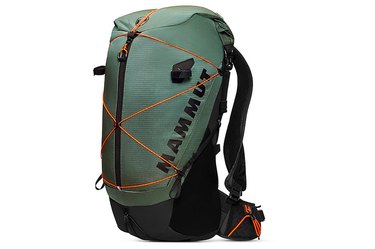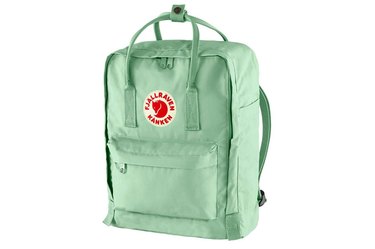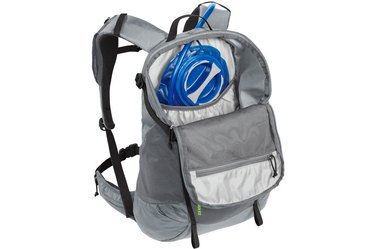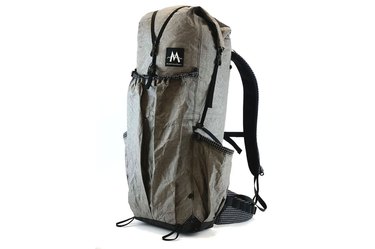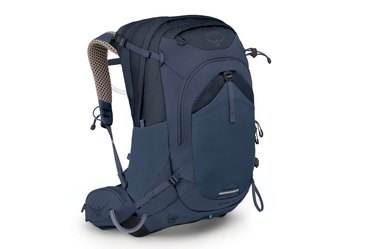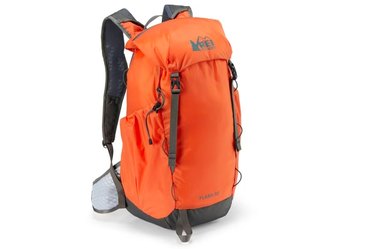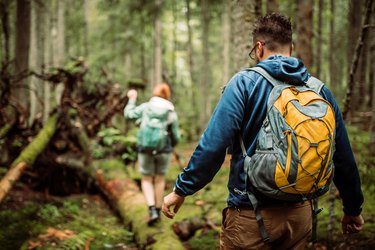
When the mountains call, you simply must go. And regardless of weather or season, you can always reap the benefits of hiking if you're well prepared. Before you hit the trails for a day hike, you'll need a good hiking backpack to store essential hiking gear.
"Every pack is essentially built the same way: a large-capacity sack holds a majority of your weight and a variety of smaller compartments help separate and manage your gear," says Wade Morris, experienced hiker and athlete for Salewa and Wildcountry. "But they will all feel different to each individual person."
Video of the Day
Video of the Day
Everyone needs something a little different based on their hiking style and packing preferences. But with so many hiking backpacks to choose from, it can feel overwhelming when you start doing research and reading reviews.
To make things easier, we asked mountaineers and outdoor experts to recommend the best hiking backpacks for day hikes and tips on how to shop for one.
How We Chose
We chatted with avid hikers to learn all about what makes a good hiking backpack. We used their guidance and recommendations, as well as our own firsthand experience, to find the best products based on factors including:
- Size
- Weight
- Padding
- Fit
The Best Hiking Backpacks
- Most Versatile: Ultimate Direction Fastpack 20 ($149, UltimateDirection.com)
- Best With Easy Storage: Osprey Talon/Tempest ($160, Osprey.com)
- Best for Tough Elements: Mammut Ducan Spine ($214.95, Moosejaw.com)
- Best for Daily Use: Fjallraven Classic Kanken ($90, Fjallraven.com)
- Best Hydration Pack: Camelback Rim Runner X22 ($100, Camelbak.com)
- Best Ultralightweight: Mountain Laurel Designs Prophet 48L ($245 to $325, MountainLaurelDesigns.com)
- Most Supportive: Osprey Mira/Manta ($220, REI.com)
- Best for Flexible Storage: REI Co-op Flash Pack 22 ($59.95, REI.com)
1. Most Versatile: Ultimate Direction Fastpack 20
The large front compartment of this hiking backpack can fit things like your phone, wallet, map, extra set of clothes and first aid kit. It also has loops on the sides for attaching your hiking poles and two large side pockets for easy access to your water bottle and a snack.
Perfect for a day hike, it's lightweight, has a breathable mesh back and is made with durable ripstop material in case you brush up against some tree branches or scrape against a boulder.
"The Fastpack is the most 'runnable' pack in our field," Morris says. "It doesn't offer the same support as some of the other backpacks but when packed right, you'll never leave it at home."
LIVESTRONG.com's Senior Fitness Editor, Jessica Campbell-Salley, likes Ultimate Direction packs for their lightweight, snug fits.
"If I'm going out for a short day with no need for tons of layers, where maybe I'm hiking up and running down, Ultimate Direction is my go-to," she says.
Buy it: UltimateDirection.com (women's), UltimateDirection.com (men's); Price: $149.95 (women's), $149.95 (men's)
2. Best Hiking Backpack with Easy Storage: Osprey Talon and Tempest 22
Whether you're running or biking on trails, consider this 22-liter pack for your next outdoor adventure. (The Talon is the name for the men's and unisex pack; the Tempest is the women's version). It not only has tons of pockets for all of your belongings, but it comes with attachments for your bike helmet, poles and flashlight and features a convenient external hydration sleeve.
"What's not to love? It's lightweight, well-ventilated and versatile," California-based yoga, Pilates and barre instructor Vanessa Dunn, who has thru-hiked the Pacific Crest Trail and Tour du Mont Blanc, says.
Her favorite feature is the hip-belt pockets, which allow you to keep the items you need most frequently — lip balm, ID, phone or energy bars — within arm's reach. No more having to remove your pack for every little thing. Most other backpacks in this size category don't offer hip pockets.
Buy it: Osprey.com (men's), Osprey.com (women's) ; Price: $160
3. Best for Tough Elements: Mammut Ducan Spine
If you're hiking in rough weather, this backpack is your ultimate companion. It comes with a detachable rain cover and has an extra waterproof pocket that you can attach to multiple places on the bag.
It also has a zipper pocket on the hip belt, where you can stash valuables or things you need quick access to, like your phone or compass.
"This backpack is excellent for its main feature of having even distribution of weight across your hips and shoulders," says Holly Roser, CPT, a certified personal trainer and owner of Holly Roser Fitness Studio. This ensures that no one body part bears all the weight of your pack.
Buy it: Moosejaw.com; Price: $214.95
4. Best for Daily Use: Fjallraven Classic Kanken
This Swedish pack has a simple, everyday design, but its spacious pockets and foam cushioning also make it well-suited for short adventures in the woods.
"Kanken packs were designed to prevent back pain in children, and this pack has done just that," Dunn says. "It's surprisingly comfortable to wear daily, whether it's to town or to the trail." While it has a school vibe, it fits adults as well. And no matter your style, you'll likely find a Kanken you like — it comes in 56 (!) colors.
Buy it: Fjallraven.com; Price: $90
5. Best Hydration Pack: Camelbak Rim Runner X22
Made for day hikers who want to prioritize hydration but still be able to pack a few other necessities, this backpack is compact and lightweight and equipped with multiple storage areas. Plus, the hip belt transfers weight to your hips instead of your back.
"I love how this pack is so versatile. It's very easy to adjust, and the water bladder doesn't leak," Roser says. "It also holds 2.5 liters of water, which is really important when hiking."
Camelbak water reservoirs are also Campbell-Salley's favorite. "They last for years — like, six — before they spring a leak, and the bite mechanism is the most comfortable," she says. "Whenever I have to replace a reservoir, I buy a Camelbak."
Buy it: Camelbak.com (men's), Camelbak.com (women's); Price: $100
6. Best Ultralightweight: Mountain Laurel Designs Prophet 48L
This pack has a larger capacity than you'll likely need for a daypack, but at 17.5 ounces, it's one of the lightest packs out there — and if you don't need all the it allows space, you can just roll it up. The fabric and construction are that versatile.
"If weight is the most important thing to you on a hike, you can't go wrong with this pack," Campbell-Salley says. "It's durable, seriously lightweight, versatile and comfortable to boot."
Its fabric is built to withstand years of hikes and has fully taped seams to help your gear protect against the elements. It's expensive, but with its size versatility, you won't need another pack for a long, long time.
Buy it: MountainLaurelDesigns.com; Price: $245 to $325
7. Most Supportive: Osprey Mira or or Manta
The backpack has comfortable padded straps, a sternum strap and a hip belt for supportive and comfortable carrying.
"It can hold enough water for a two- to four-hour hike and has plenty of extra pockets for snacks, first aid supplies, extra socks and an extra lightweight layer," says Natasha Caleel, occupational therapist and hiker based in Santa Barbara, California.
"I use this backpack on rigorous hikes uphill, as it doesn't get in the way, doesn't hurt my back and has plenty of easily accessible pockets."
This is Campbell-Salley's favorite pack for trail days that require carrying lots of gear. The webbed suspension helps keep her back dry and the weight off her spine, which makes a big difference when she's logging major miles.
"This pack is so comfortable, even when I've got a full water bladder, two jackets, multiple snacks and dog treats," she says.
8. Best Budget Pick: REI Co-op Flash Pack
The flexible shell in this backpack conforms to the shape of your belongings so you don't ever feel like you're shoving in things that don't quite fit. The stretchy pockets on the sides make it easy to access things like your map or water bottle.
"You can use the tie-down straps to contour the backpack to your load, and the backpack comes in three different sizes," Caleel says. "This backpack has a variety of convenience features and is great for a long day hike or short adventure."
The 22-liter pack comes in well under $100, which can be a tough find for this size hiking backpack. As Caleel mentioned, it also comes in a 55-liter size (for bigger adventures) and an 18-liter size for when you want to carry just the basics.
Buy it: REI.com; Price: $60
What to Look for When Shopping for a Hiking Backpack
When you're looking for the best hiking backpacks for day trips, it's important to keep in mind how much storage space you'll need, the type of material for the weather you'll be hiking in and how convenient the pockets and straps are for keeping your essentials readily available.
The numbers in most pack product names correspond to their packable volume in liters. Anything above 35 liters is probably more suited to backpacking trips, unless it can be packed down, like the Mountain Laurel recommendation.
Before you purchase a hiking backpack, consider the following tips.
1. Choose the Right Fit
It doesn't matter if it's your favorite color — if a pack doesn't fit correctly and isn't comfortable, it has the potential to ruin your hike. That's why experts recommend testing out a potential pack before buying or purchasing one online with a flexible return policy.
"There's no substitute for trying on a backpack and loading it down with some weight," Morris says. Just because reviews of a pack are great doesn't necessarily mean that pack will be the best fit for you.
"In the end, you are the one who's going to wear the pack, so you have to decide how the fit and feel work for you," Dunn says. "I strongly suggest shopping in-store so you have an opportunity to test out and try on different packs."
2. Balance Weight and Padding
A lightweight pack means you'll be carrying less on your shoulders, but it may also sacrifice padding and support.
"Going lighter saves you energy so you can hike farther, but have you ever had something from your pack rubbing into your back? Those five ounces for extra padding maybe would have made your day a lot better," Morris says.
3. Factor in What You'll Pack
"Before buying a hiking backpack, you want to consider how long you plan to hike for and in what conditions," Caleel says.
With day hikes, you won't need a ton of supplies like you would with overnight or multiple-day hikes, but you also don't want to leave the house with nothing. Be sure to pack water, a first aid kit, some snacks, an extra layer of clothing and a map of the trail at the very least.
"If you are taking relatively short day hikes on easy trails in moderate weather, you can get away with a smaller, lightweight backpack," Caleel says. "If you are planning to traverse rocky terrain, hike in hot or cold weather or do a longer overnight hike, you will want something with ample storage, space for a water reservoir and supportive padding."
Planning a Longer Hike?
